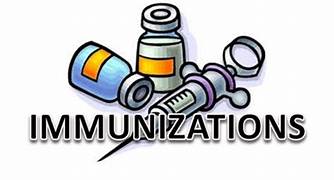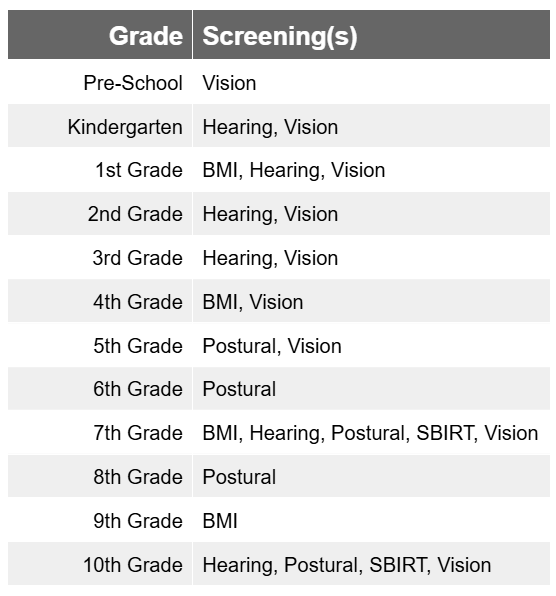
Physicals
-
Physical Examinations
We encourage the performance of the physical examination by the student's own physician. A copy of this exam, and updated immunizations, should be provided to the school nurse.Physical examinations are required:-
within one year prior to entrance to school or within 30 days after school entrance.
-
at intervals of either three or four years thereafter. In Amesbury that schedule is grades 4, 7 & 10.
-
a student transferred from another school system shall be examined as an entering student.
-
students under 16 and over 14 years of age requesting employment certificates.
-
prior to a student’s participation in competitive athletics, on an annual basis.
*Physicians requiring a form for documenting physical examinations may utilize the attached document, which adheres to the format approved by the Massachusetts Department of Public Health:
MA Health Care Provider Examination Form
-
-
Tuberculosis Screening
Each school-aged child in a Massachusetts public or private school should have a TB Risk Assessment completed and documented on the school health form.
-
Lead Screening
- The first test must be done between the ages of 9 and 12 months. Children must be tested again at ages 2 and 3.
- If you live in a high risk community, your child must also be tested at age 4.
- Every child must have a lead test before they begin daycare, Kindergarten, or preschool.
Where can I get my child's lead test?
- Your child should have had their lead test completed before reaching school age. Please reach out to your child's primary care physician to obtain the results of the lead test. If your child has not been tested, you may request a letter from your child's physician indicating that your child was deemed not at high risk for lead exposure.
Massachusetts School Health Record

Immunizations
-
Massachusetts School Immunization Law
School Immunization Law, Chapter 76, Section 15 of the General Laws of the State of Massachusetts requires that all immunizations must be up to date for children to attend school.
- Massachusetts General Law allows for the school district to exclude children from school whose immunizations are not up to date.
- A certified record of immunizations from your child's physician(s) is required for entry into school.
- All immunization records must be provided in English and include full dates.
Immunizations are audited by the school nurses. In the event of missing or incorrect information, your prompt attention in addressing the error/omission is imperative to assure compliance with state law. The current state requirements can be found here: Massachusetts School Immunization Requirements from Mass.gov.
-
Preschool Entry Requirements
- Hib: 1-4 doses; the number of doses is determined by vaccine product and age the series began
- DTaP: 4 doses
- Polio: 3 doses
- Hepatitis B: 3 doses; laboratory evidence of immunity acceptable
- MMR: 1 dose; must be given on or after the 1st birthday; laboratory evidence of immunity acceptable
- Varicella: 1 dose; must be given on or after the 1st birthday; a physician documented case of chickenpox or laboratory evidence of immunity acceptable
-
Kindergarten-6th Grade Requirements
- DTaP: 5 doses; 4 doses acceptable if the 4th dose is given on or after the 4th birthday. DT is only acceptable with a letter stating medical contraindications to DTaP.
- Polio: 4 doses; 4th dose must be given on or after the 4th birthday and ≥ 6 months after the previous dose, or a 5th dose is required. 3 doses are acceptable if the 3rd dose is given on or after the 4th birthday and ≥ 6 months after the previous dose.
- Hepatitis B: 3 doses; laboratory evidence of immunity acceptable
- MMR: 2 doses; first dose must be given on or after the 1st birthday and the 2nd dose must be given ≥ 28 days after the previous dose; laboratory evidence of immunity accepted.
- Varicella: 2 doses; first dose must be given on or after the 1st birthday and the 2nd dose must be given ≥ 28 days after the previous dose; a physician documented case of chickenpox or laboratory evidence of immunity is acceptable.
-
Grade 7th-12th Requirements
- Tdap: 1 dose and a history of DTaP primary series or age-appropriate catch-up vaccination.
- Polio: 4 doses; 4th dose must be given on or after the 4th birthday and ≥ 6 months after the previous dose, or a 5th dose is required. 3 doses are acceptable if the 3rd dose is given on or after the 4th birthday and ≥ 6 months after the previous dose.
- Hepatitis B: 3 doses; laboratory evidence of immunity acceptable
- MMR: 2 doses; first dose must be given on or after the 1st birthday and the 2nd dose must be given ≥ 28 days after the previous dose; laboratory evidence of immunity accepted.
- Varicella: 2 doses; first dose must be given on or after the 1st birthday and the 2nd dose must be given ≥ 28 days after the previous dose; a physician documented case of chickenpox or laboratory evidence of immunity is acceptable.
- Meningococcal: Please view requirements that are based on age below.
-
Meningococcal Requirements
- Grade 7-9: 1 dose; 1 dose MenACWY (formerly MCV4) required. Meningococcal B vaccine is not required and does not meet this requirement.
- Grade 10-12: 2 doses; second dose MenACWY (formerly MCV4) must be given on or after the 16th birthday and ≥ 8 weeks after the previous dose. 1 dose is acceptable if it was given on or after the 16th birthday. Meningococcal B vaccine is not required and does not meet this requirement.
-
Immunization Exemption
Per the Department of Public Health:
"Massachusetts students must provide documentation of immunization, according to school requirements, or show a medical or religious exemption. Medical exemptions come from the student’s doctor and document a contraindication — the reason why an individual cannot medically receive the vaccine. Religious exemptions come from the parent/guardian, and state in writing that a vaccine conflicts with his/her sincerely held religious belief."
Click here for a: Request for Religious Exemption from Immunization Requirements
Parents/guardians are not required to use the aforementioned Request for Religious Exemption form and may submit their personal letter provided it complies with the provisions of Chapter 76, Section 15, General Laws of Massachusetts.
Furthermore, if your child requires a Medical Immunization Exemption, a parent/guardian must provide a letter from their child's healthcare provider that details the contraindication or medical justification for the vaccination's omission. If applicable, a proposed delayed vaccination schedule should also be included.
All exemptions and delayed vaccination schedules should be submitted directly to your designated school nurse, either in person or via fax.
-
MA School Immunization Forms
For the most updated information on Massachusetts School Immunization requirements, please visit the mass.gov link:
MA School Immunization Requirements
If you need a copy of the Massachusetts Certificate of Immunizations to be completed by your healthcare provider, please click here and return to your school nurse:
MA School Immunization form
Massachusetts School Immunization Requirements for 2024-2025

Screenings
-
MA School Health Law
Massachusetts School Health law, M.G.L. Chapter 71, Section 57 and 105 CMR 200.000, requires schools to provide regular health screenings for students. Also required is a follow up with the results of these screenings with families and referrals to primary health care providers as necessary.
-
What are the types of screenings?
Children who cannot see, hear, or are growing improperly may be having difficulty learning. We recommend having your child seen by a physician if they fail a screening.
- Screening, Brief Intervention and Referral to Treatment (SBIRT): This substance abuse screening takes place in 7th and 9th grades.
- Vision Screening: Vision screening is conducted yearly in grades Pre-K through 5, and in grades 7 and 10. Parent(s)/guardian(s) will be notified of any problems that necessitate medical follow-up.
- Hearing Screening: Hearing screening is conducted yearly in grades K through 3, and in grades 7 and 10. Students that fail testing initially will then be retested no sooner than 2 weeks. If a student fails their retest, parent(s)/guardian(s) will be notified of any hearing problems that necessitate a medical follow-up.
- Postural Screening: The state of Massachusetts mandates that all students in grades 5 through 9 be screened for scoliosis. Your child's posture will be screened beginning in the fifth grade. Physician referrals will be made as needed and notification will be given to parent(s)/guardian(s).
- Growth Screening: Heights and weights are measured and body mass index (BMI) is calculated on children in grades 1, 4, 7 and 10.
You may request a screening at any time if you are concerned your child has a problem with vision, hearing, posture, or growth.
Parent(s)/guardian(s) may waive any of these screenings by submitting a written request to the school nurse.
Please read "Exemption from Screenings" below on how to exempt your child from any screenings.
For more information on school health screenings, visit:
www.mass.gov/lists/school-health-screening
-
Exemption from Screenings
To opt-out of mandated screenings, the state requires that the parent/guardian notify the designated school nurse in writing, which includes:
- date,
- parent/guardian name,
- student name,
- specific screening(s) the student is to be exempt from.
Written exemptions need to be submitted in writing to the school nurse towards the beginning of EACH school year prior to the start of screenings.
For further questions or concerns, please contact your designated school nurse.
-
SBIRT Screening
Screening, Brief Intervention and Referral to Treatment (SBIRT)
SBIRT as part of routine healthcare practice can reduce unhealthy alcohol and drug use.
SBIRT is a public health approach that can deliver an early intervention to anyone who uses alcohol and/or drugs in unhealthy ways.
Screening - Short, well-tested questionnaire identifies risk (such as the ASSIST, the CRAFFT, the AUDIT, the DAST, etc.)
Brief Intervention - Short, structured conversations that feature feedback and options for change
Referral - For in-depth assessment and/or diagnosis and/or treatment, if needed
Treatment - Between 1% and 10% may need some level of treatment - depending on the health care setting.
SBIRT can help healthcare and other professionals determine whether a patient/client uses alcohol and/or drugs in unhealthy ways. Research shows that they can engage individuals in brief, non-judgmental conversations about their substance use and help them decide whether/how to reduce their use to improve their long-term health.
"Screening, Brief Intervention and Referral to Treatment (SBIRT)" (Bureau of Substance Addiction Services, "Health & Social Services," DPH, 1 January 2025, https://www.mass.gov/info-details/screening-brief-intervention-and-referral-to-treatment-sbirt)
-
Vision Screening
"It is well-documented that timely identification and treatment of many vision disorders in young children can prevent permanent vision loss. Scientific studies have also documented that undetected or untreated vision disorders in children can negatively affect acquisition of early literacy skills. MDPH recognizes vision screening does not detect all vision disorders, and that a vision screening is one step in the system of vision care for children. Children who do not pass a vision screening require a comprehensive eye examination from an eye doctor for evaluation, diagnosis, and if needed, treatment and follow-up."
Read this letter from the Commonwealth of Massachusetts on the updated Massachusetts vision screening protocol:
DPH: Updated MA Vision Screening Protocols
-
Hearing Screening
Hearing Screening Referral and Follow-up
"Regulations developed under the Comprehensive Special Education Law, c.766 p.306, 1(D), specify that, beginning with the third birthday, children with special needs or children suspected to have a hearing problem by their parent/guardian must be given a test for auditory functioning appropriate to the child’s age and developmental stage... Appropriate medical and audiological follow-up and referrals are central to an effective system. In general, all children who fail the initial screening must be retested within 1-2 weeks before being considered a candidate for a notice to the parent/guardian. A repeat failure of the screening justifies parental notification in writing. Children should be referred for further assessment when they are unable to identify 20dB at 1000, 2000, or 4000 Hz upon rescreening. The typical failure rate in a screened population is approximately 2½–3%. If the findings of the hearing screening vary significantly from this (either consistently higher or lower), a review should include, at a minimum, the skill of the tester, the appropriateness of the testing site (i.e., presence of ambient noise), the condition of the audiometer, and an evaluation of the testing procedures. Screening tests are not diagnostic; they merely identify students who may need further attention by a primary care provider or audiologist."
SHIELD, BUCMECNE, MDPH. 2020. School Health Screening Handbook, p 21, https://d2rw76b9nsxu2w.cloudfront.net/nodes/1136/Screening_Handbook-FINAL11-9-20.pdf.
-
BMI Screening
BMI is a measure that is used to show a person’s weight for height for age. It is calculated using an individual’s height and weight. Just like a blood pressure reading or an eye screening test, BMI can be a useful tool in identifying possible health risks, but it does not provide a diagnosis.
Massachusetts schools have taken students’ heights and weights each year since the 1950s. According to the state’s BMI screening regulations (approved in 2013), schools must now collect the heights and weights of students in grades 1, 4, 7 and 10. BMI data collected for all children in these grades will be gathered and reported to the Massachusetts Department of Public Health as a combined number. No individual student’s BMI results will be shared with anyone other than you (upon request).
The school nurse will supervise your child’s screening and will make sure your child’s privacy is respected at all times. Your child’s height, weight, and BMI measurements are strictly confidential – results will be kept in your child’s school health record and will not be shared with anyone without your written permission.
Your designated school nurse will email you when screenings are expected to start. All children in grades 1, 4, 7 and 10 will have their height and weight measured and will have their BMI calculated at that time. Parents and/or legal guardians can request that their child not participate in this screening. This request must be submitted in writing to your designated school nurse.
Additional information about children’s wellness and fitness is available upon request, or you may access the state’s resources at www.mass.gov/massinmotion/.
-
Postural Screening
Purpose: The purpose of postural screening is to identify early signs of spinal problems.
How it's completed: Under the direction of the school nurse and in a private location, ensuring the student's safety and comfort. The student will be given instruction and encouraged to ask any questions.
What to wear: It is preferred that males wear no shirt or a tight-fitting undershirt. Females should wear a bathing suit, halter top or sports bra.
What happens with findings: Parents will be notified of any identifying spinal problems and provided with a referral to follow up with their primary care provider.
"The school nurse and physical educator should both be informed about students whose physicians have prescribed braces. The school nurse may need to supervise skin care. In most cases, students who wear braces will be encouraged to participate in a wide range of physical education activities, but the physical educator will need to be informed about each physician's recommendations."
Mandated Health Screenings by Grade
-
Revised: 2/2025


